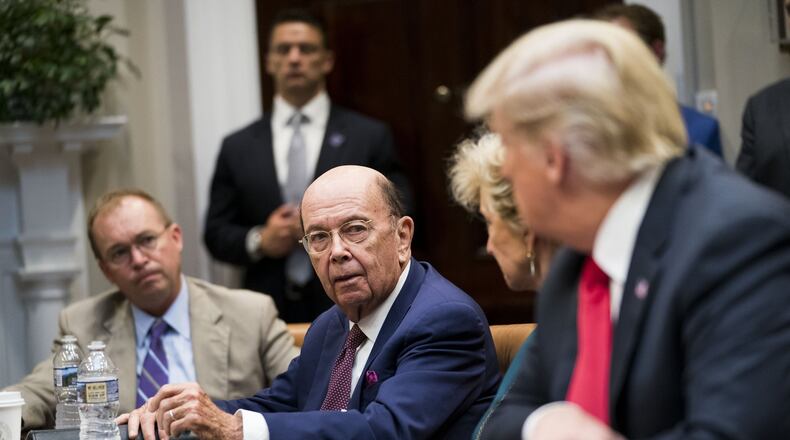The U.S. Supreme Court on Thursday placed on hold the Trump administration’s plans for adding a citizenship question to the 2020 census, plunging the fate of the matter into uncertainty with time running short before the survey forms must be printed.
Those opposed to the citizenship question cautiously applauded the court’s decision, while Trump floated the idea of delaying the census until the legal battle is over.
For Georgia and other states, there’s a lot riding on the decennial count. Mandated by the Constitution, the census helps determine the number of seats each state has in the U.S. House of Representatives, how state legislative districts are drawn and where the government should distribute more than $675 billion in federal funds each year.
Writing for the majority, Chief Justice John Roberts called the government’s explanations for the citizenship question “contrived.”
The Trump administration has said that including the question — Is this person a citizen of the United States? — would help it better track demographics and enforce the federal Voting Rights Act. But critics maintain that the question would discourage immigrants living in the shadows from responding to the survey.
Siding with a lower court’s decision to send the issue back to U.S. Commerce Secretary Wilbur Ross for a better explanation, Roberts wrote, “The reasoned explanation requirement of administrative law, after all, is meant to ensure that agencies offer genuine justifications for important decisions, reasons that can be scrutinized by courts and the interested public.
“Accepting contrived reasons would defeat the purpose of the enterprise. If judicial review is to be more than an empty ritual, it must demand something better than the explanation offered for the action taken in this case.”
Liberal Justices Ruth Bader Ginsburg, Stephen Breyer, Sonia Sotomayor and Elena Kagan joined Roberts in that part of the court’s ruling. Dissenting, Justice Clarence Thomas said that, between 1820 and 2010, all but one census questionnaire asked some segment of the population a question related to citizenship.
“For the first time ever, the court invalidates an agency action solely because it questions the sincerity of the agency’s otherwise adequate rationale,” wrote Thomas, who was joined by fellow conservative Justices Neil Gorsuch and Brett Kavanaugh.
Justice Samuel Alito was pointed in his own dissent.
“To put the point bluntly,” he wrote, “the federal judiciary has no authority to stick its nose into the question whether it is good policy to include a citizenship question on the census or whether the reasons given by Secretary Ross for that decision were his only reasons or his real reasons.”
Following the court's ruling, Trump announced on Twitter that he had asked lawyers about delaying the census until his administration can give the high court additional information it can use to make a "final and decisive decision."
“Can anyone really believe that as a great Country, we are not able the ask whether or not someone is a Citizen,” he tweeted. “Only in America!”
The U.S. Census Bureau, which is required by law to keep the personal information it collects confidential, has estimated inserting the citizenship question could reduce population counts by about 6.5 million people nationwide.
RELATED: City identifies, corrects nearly 80,000 addresses before 2020 census
Former Democratic gubernatorial candidate Stacey Abrams cheered the court on Twitter for “refusing to allow the citizenship question to erase immigrants & Hard-to-Count (population) from our American narrative.”
Republican Gov. Brian Kemp had no comment. Georgia Republican Party officials did not respond to requests for comment.
As many as 177,000 people in Georgia, or nearly 2%, would go uncounted because of the possibility of the citizenship question on top of other changes that could cut down on participation, such as less funding for the Census Bureau and online responses being allowed for the first time, says a report released this month by the Urban Institute, a left-leaning think tank. Some 136,600 black people, 39,700 Hispanics and 46,400 children under 5 could be missed in Georgia under a worst-case scenario, the Urban Institute estimated.
Existing census data provides clues about which Georgia counties could be affected. In the Atlanta region’s four largest counties, the percentages of people who were born in Latin American countries and who are not U.S. citizens range between 3% and 8%. The numbers are higher in some rural counties. For example, in Whitfield County, home to much of Georgia’s carpet industry, the total is 13%. It is 11% in Hall County, where the poultry industry is prominent.
It was unclear Thursday whether there is still enough time for the Trump administration to prevail in the legal battle and include the citizenship question in the survey before the census forms are to be printed this summer, though some officials say they could be printed as late as this fall. Harvey Soto of Georgia Association of Latino Elected Officials predicted it is too late.
“We must take this victory as a sign that it is now more important than ever for Latinos, immigrants and all communities to be counted in the census,” Soto, a policy analyst and program coordinator for the association, told reporters at a news conference in Norcross.
Appearing with Soto, Hillary Li, an attorney with Asian Americans Advancing Justice Atlanta, was more cautious.
“As the court is allowing the Commerce Department a chance to provide an alternative explanation, the decision does not absolutely rule out the possibly of a citizenship question on the census,” she said. “We recognize the work continues to ensure that the citizenship question stays off the census and to make sure everyone is counted when the time comes.”
Percentages of county residents born in Latin America who are not U.S. citizens
Cobb: 5.5%
DeKalb: 4.4%
Fulton: 2.9%
Gwinnett: 8.4%
Source: U.S. Census Bureau.
*Latin America refers to countries in South America, Central America and the Caribbean.
About the Author
Keep Reading
The Latest
Featured


